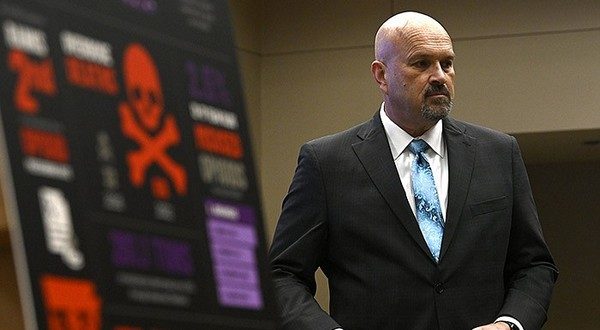
Kirk Lane, director of the Arkansas Opioid Recovery Partnership, noted Friday that settlement funds will be spread over 16 to 18 years. (Photo courtesy of Arkansas Democrat-Gazette)
The newly formed Arkansas Opioid Recovery Partnership announced Friday its application process for funds from the state’s $216 million opioid settlement allocation is open and revealed initial plans for the settlement money.
The announcement, held at the headquarters for the Association of Arkansas Counties in Little Rock, coincided with the launch of the group’s website, arorp.org.
The ARORP is a partnership between the Association of Arkansas Counties and the Arkansas Municipal League.
The conference was led by ARORP Director Kirk Lane, Assistant Director Tenesha Barnes and Chris Villines, executive director of the Association of Arkansas Counties.
Among the group’s intended uses for the funding will be setting up the Arkansas Naloxone Bank in relation to the AR Community Hero Program. Naloxone is an FDA-approved drug to reverse opioid overdoses.
“We’re buying, to start with, a half a million dollars in naloxone for Arkansas families,” Lane said. “We are putting that in a credit in the bank. We will approve people through the HERO Program to be those distribution points to the people in our communities. So people that can teach people they identify as family members in need, and distribute that naloxone out free of charge to them through them.”
The ARORP will also use funds to pay for overdose response teams that will be more deeply involved in the events following an overdose than what’s typically done by law enforcement.
“It allows for a law enforcement agency to form together and come and apply for funding to fund a person, an investigator, to respond to overdoses in that community, partnered with a peer recovery specialist, a person with lived experience to go as that team to deal with that situation,” Lane said. “So this overdose response team formulates that for a time, and the state has done a good job of doing some pilots, but those pilot monies are about to run out.”
Friday’s news conference came just over a year after state Attorney General Leslie Rutledge announced in October 2021 that Arkansas would receive $216 million as part of a $26 billion national opioid settlement.
The settlement resulted from roughly four years of litigation against pharmaceutical distributors Cardinal, McKesson and AmerisourceBergen, plus opioid manufacturer and marketer Johnson & Johnson.
Lane said Friday that Arkansas has received $10 million from the settlement so far. The rest is expected to be received over the course of roughly 18 years. The money will be split evenly, with cities, counties and the state each receiving one-third of every Arkansas dollar.
The settlement money is subject to court supervision and can only be spent for future programs, projects and strategies to end the Arkansas opioid epidemic.
The Qualified Settlement Fund was established and will be overseen by the Crittenden County Circuit Court.
“People are welcome to submit their proposals, but realize that we have this funding now spread over 16 to 18 years, and there’s still settlements that are out there that aren’t complete,” Lane said. “So that number may build on where we’re going, and we want to be good stewards of that money and we want to work with all of you to do just that.”
Friday’s event came two days after CVS Health Corp., Walgreens Boots Alliance Inc. and Walmart Inc. reached a tentative agreement to pay more than $13 billion related to thousands of lawsuits connected to the mishandling of opioids.
Arkansas-based Walmart is expected to pay $3 billion.
“I know that’ll be a piece that we’ll add to where we’re going,” Lane said.
Lane started in his position on Aug. 22 after serving as Arkansas’ drug director since August 2017.
Lane said the first few months of ARORP’s existence have been like “flying a plane and building it, too.”
“It’s been working as expediently as possible and building a website, laying all the foundation to ground rules, meeting with attorneys to make sure that we’re doing everything right according to that court order, and our own plans, talking to board members, interviewing board members and bringing them all together … and formatting what we’re doing and making sure that everybody plays well in the sandbox to do well for cities and counties.”
According to a Arkansas Democrat-Gazette story from 2018, between 2013 and 2016 Arkansas experienced 800 deaths from opioid overdoses.
In September, citing numbers from the Arkansas Opioid Response Dashboard, the Arkansas Advocate reported opioid-related deaths in Arkansas increased from 180 in 2019 to 261 in 2020 and 371 in 2021.
The most recent numbers available from the Centers for Disease Control and Prevention show Arkansas had 546 general overdose deaths in 2020. That ranked 17th fewest in the country, including Washington, D.C.
WebReadyTM Powered by WireReady® NSI










